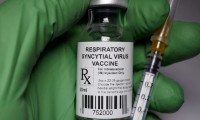-
European Commission to receive fewer Pfizer-BioNTech vaccine doses under amended contract
- Source: drugdu
- 121
- May 30, 2023
-
New vaccine boosts hopes of eliminating meningitis across Africa
- Source: drugdu
- 115
- May 26, 2023
-
CureVac seeks to accelerate vaccine infringement case against Pfizer and BioNTech
- Source: drugdu
- 118
- May 23, 2023
-
CDC
- Source: drugdu
- 115
- May 22, 2023
-
FDA advisors recommend Pfizer’s RSV vaccine for infants but raise safety concerns
- Source: drugdu
- 115
- May 20, 2023
-
Universal flu vaccine based on mRNA tech to be tested by National Institutes of Health
- Source: drugdu
- 119
- May 17, 2023
-
Experts call for monitoring of respiratory vaccine after trials suggest possible increase in preterm births
- Source: drugdu
- 166
- May 12, 2023
-
GSK’s RSV vaccine approved by FDA for older adults
- Source: drugdu
- 145
- May 12, 2023
-
Understanding the adverse events profile of MVA-BN vaccine for Mpox
- Source: drugdu
- 138
- May 12, 2023
your submission has already been received.
OK
Subscribe
Please enter a valid Email address!
Submit
The most relevant industry news & insight will be sent to you every two weeks.













